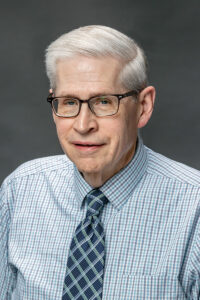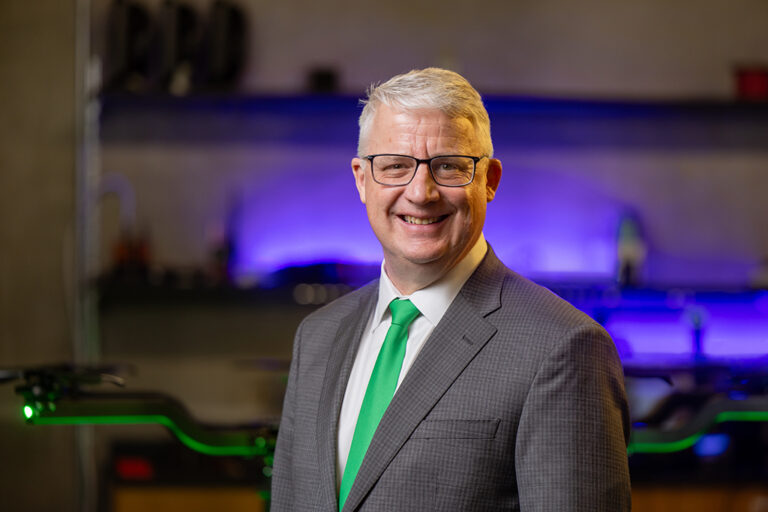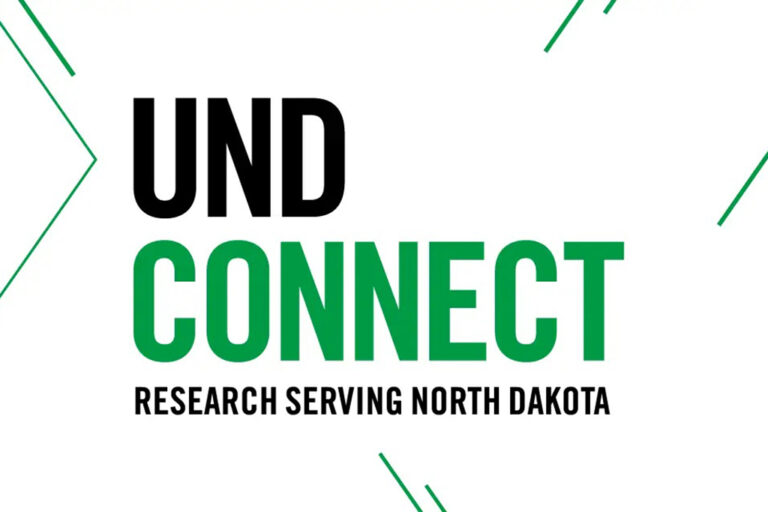Chancellor: COVID-driven technologies may have costs as well as benefits
Higher ed can help society strike the right balance, NDUS Chancellor Mark Hagerott says to UND education task force

Is the COVID-19 pandemic sending us down a technological “rabbit hole” faster than we realize and toward consequences we don’t fully comprehend?
Mark Hagerott, North Dakota University Systems (NDUS) Chancellor, believes this is a question educators, as well as state and national leaders, must address before technologies being rapidly developed to deal with the impacts of the COVID pandemic cause lasting harm. Last week, he gave a virtual seminar to the UND Task Force on the Future of Education titled, “Human Vitality in the Age of Digital Machines.”

Hagerott’s concern is that rapidly changing digital technology will concentrate power in the emerging fields of cyberspace and robotics. He sees this as “a transforming force that may damage human-centric systems and society.” In addition, COVID-mitigation policies – combined with new digital technologies – might “undermine social equality, labor markets, human community, health, and culture in the long term.”
UND President Andrew Armacost introduced Hagerott by recognizing his experience as a senior leader in the U.S. Navy and former educator at the Naval Academy who blends the perspective of a historian with technical expertise in cybersecurity and nuclear power.
“He brings it all in a package that really connects the fourth industrial revolution – or the digital economy – and the evolutions we’re seeing accelerate at a rapid pace,” Armacost said.
Digital transformations
Hagerott’s presentation was based on his Northern Plains Ethics Journal paper titled, “The Pandemic is Accelerating Digital Transformation: What Could be the Downside for Humanity? And What to Do?” In April, it will be published in excerpt form by the National Academies Press in the National Academy of Sciences, Engineering, and Medicine reports.
Hagerott noted UND’s role in the research and development of autonomous systems, artificial intelligence, machine learning and big data. He wonders if machines and the small number of elite companies and programmers who control them could begin to act in ways never anticipated.
“When I first gave this brief 15 years ago, it was like, ‘Yeah, is that a big issue or not?’ Well, it’s a massive issue,” he said, pointing out how U.S. leaders from the past dealt with the Industrial Revolution by adapting new laws and policies.

“The challenge we have is to build the next set of educators who take this over and help our society continue to adapt,” Hagerott continued. “How complex or big is it? Well, it’s massive, it’s gone fast, and it’s going faster.”
Hagerott said these developments were not only unanticipated, but also “completely mind-bending.” He alluded to factories in which robots now build other robots 24 hours a day and autonomous, unmanned aircraft that might soon battle each other for control of the skies.
“A hundred years ago, nobody was writing about cyberspace, but they were writing about robots,” he said. “The people alive right now, I would argue, are the most important ever alive because we’ve never had the emergence of intelligent machines before.”
Decisions ahead
Moral, ethical and policy decisions lie ahead that will determine how interactions between the human, natural and cyber worlds play out.
“It’s part of an ongoing technical evolution from a world built around human interactions with nature and, later, rudimentary machines to a world with intelligent robotic machines and cyberspace,” Hagerott explained. “They can now independently exist from us, but then they also overlap and integrate with us, which is leading to all sorts of complexity.”

This complexity, combined with the speed of technical development, is being exacerbated by the COVID pandemic. Hagerott sees this as a challenge for higher education.
“The problem with COVID is it’s now going at such a speed that we are having trouble adapting with the given structures we have,” he related. “This is basically how to think about how the world works – animals, humans and machines – going round and round, faster and faster. When you take all this together, it starts to build a whole new macro-level of economic, social, and military interaction.
“What I submit that you’re going to be tangling with and challenged with – especially with being a flagship university – is the emergence of two revolutions that are bringing two realms into existence: the robotic artificial intelligent machines moving in three-dimensional space and, second, an entirely artificial realm of cyberspace with no moving parts or physical places.”
The COVID pandemic has accelerated the pace of this technology, according to Hagerott, to the point where advances that once took a decade now take six months. This is leading to a massive shift in wealth, with businesses such as airlines, restaurants and hotels being crushed financially, causing a massive loss of jobs.
“Companies are being weakened with layoffs,” he said. “It’s a stunning development.”
A digital portal for the Upper Midwest
One of the more than 140 participants in the virtual seminar asked Hagerott if there was a way for UND faculty to help facilitate – at a high level – the kind of interdisciplinary work necessary for the future.
Hagerott discussed the NDUS Dakota Digital Academy (DDA), created last year to coordinate, expand, and enhance educational opportunities in North Dakota and the Upper Midwest. DDA facilities also support students pursuing skills and education in the digital world.
“We envisioned the Dakota Digital Academy for exactly this purpose,” he said. “That’s for collaboration. We need a voice for the Midwest. We need like-minded people in the liberal arts, humanities, policy, and law to find each other, and the Dakota Digital Academy is that type of thing. We are glad to promote collaboration through that portal.”
Hagerott said the DDA portal is also open to companies that want to post internships or hire people with expertise in a particular area, such as a law student with a certificate in cyber and digital privacy.
UND’s Task Force on the Future of Education was formed last fall and will complete its work in April. John Shabb, Associate Professor, School of Medicine & Health Sciences, and Jeff VanLooy, Associate Professor, Earth System Science & Policy, serve as task force co-chairs. Its objectives are to:
- Create a framework for developing short and long-term strategies to shape an academically and fiscally robust environment that satisfies the educational needs of the next generation of UND students.
- Educate the University community about big issues facing higher education today and what the future might hold for education at UND.



